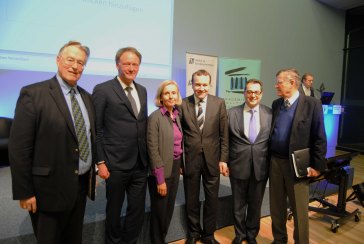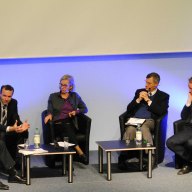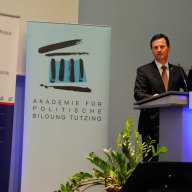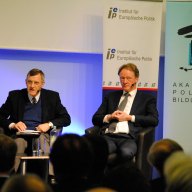Evening event with Manfred Weber, MEP, on the topic: The EU vis-à-vis new foreign affairs and defence tasks: The Ukraine Crisis and IS Terrorism as a central challenge”

On 29 January 2015, the Institute for European Politics-Berlin, in cooperation with the Akademie für Politische Bildung Tutzing, as well as the Europa-Union München and the Griechische Akademie, organized a podium discussion in the premises of the IHK Akademie München on the topic: “The EU vis-à-vis new foreign affairs and defence tasks: The Ukraine Crisis and IS Terrorism as a central challenge.” Manfred Weber, MEP and Chairman of the European’s People’s Party Group in the European Parliament; Dr. Mathias Jopp, Director of the Institute for European Politics; as well as Dr. Ursula Münch, Director of the Akademie für Politische Bildung Tutzing, introduced the event with their keynote addresses. Alongside Manfred Weber and Mathias Jopp, Dr. Walther Stützle, Undersecretary of Defense (ret.) and Senior Distinguished Fellow at the Stiftung Wissenschaft und Politik, and Dr. Martin Schulze Wessel, Professor of Eastern European History at Ludwig-Maximilians-Universität in München, took part in the following podium discussion, which was moderated by Ursula Münch.
As the most pressing foreign affairs challenge for Europe, the Ukraine Crisis was the predominant topic of the event. The podium speakers were of one voice in condemning the annexation of Crimea and in the assessment of the Ukraine Crisis as a danger to the European peace framework. However, disagreement arose as to how that framework might be reconstructed and whether Russia should be considered a partner or a hindrance in this matter.
Manfred Weber stressed that Russia is “no longer a trustworthy partner” because the current government is not prepared to engage in any dialogue and is conducting a war of “perfidious KGB methods,” which had already been put to the test in the Georgia War. According to Mr. Weber, the EU has nothing to criticize itself for with regard to the outbreak of conflict; after all, the free trade treaty had been negotiated with the Russia-friendly Yanukovych government. He saw the Maidan Protests in the same light as those in Cold War era Budapest and Warsaw and emphasized that there was no alternative but to support Ukraine. He ruled out military support for Ukraine and instead spoke in favor of the economic sanctions against Russia. At the same time however, he stressed that this did not mean a conclusive break with Russia.
For Walther Stützle, Russia must remain an import dialogue and negotiation partner, as it was during the construction of the Berlin Wall as the Soviet Union. According to Stützle, Russia cannot be “sanctioned to its knees”; only security assurances on the part of the EU and NATO and direct negotiations between the US and Russia can offer a way out of the Ukraine Crisis.
Mathias Jopp also emphasized that Russia must remain a negotiation partner, despite the calling into question of the Paris Charter and disregard for the Budapest Memorandum. According to Jopp, the EU has also made mistakes. For example, it could have led talks with Moscow parallel to the negotiations in Kiev. All in all, however, the EU’s unified approach to the crisis since its beginning has been positive. The most pressing question is how the lost trust between the Europeans and Russia can be won back. In this sense, the postponed entry into force of the free trade agreement with Ukraine is an advance concession. Now it is up to Russia to act, where a return to the Minsk II agreement is essential.
Martin Schulze Wessel, on the other hand, presented a fundamentally different opinion. He disputed Russia’s role in shaping the European continent and recalled the Congress of Vienna in 1814/1815, at which the European states agreed to a new peace arrangement with Russia, but at the cost of nationalist movements in East Europe. He criticized Stützle for his ambivalent position regarding the parties of the conflict, and asked that the human rights abuses in Ukraine and the “imperialistic expansion policies of Russia” clearly be labelled as such. According to Wessel, Putin thinks of himself as Catherine the Great and wants to advance the “New Russia Project,” because Russia is attempting, as before, to counteract its “backwardness” through power politics. Additionally, Russia is pursuing a strategy of splitting up the EU by trying to draw countries like Greece and Hungary closer to itself. According to Wessel, this is a very serious challenge for Europe.
With regard to the threat to Europe posed by the Islamic State (IS), Manfred Weber called for greater sharing between European intelligence agencies, while still ensuring that a balance is struck between freedom and security. According to Weber, it cannot be allowed that the perpetrators of the Paris terrorist attacks be able to buy their weapons in Brussels, even though they were known to be potentially dangerous in France. In the fight against IS, Weber welcomed the delivery of weapons to the Kurds and asked that the EU take on a greater role in the stabilization of its neighbouring countries. At the same time, one must ask if Europe has not ignored Syria for far too long, he said. Through an early intervention, it may have been possible to prevent the radicalization of an entire generation of Syrians.
In order to effectively engage current and future foreign affairs challenges, all of the participants were in agreement that a united European answer is necessary. Due precisely to the impact of the US withdrawal from Europe, EU foreign and security policy must develop and become a stabilizing factor in Europe, Weber particularly emphasized. Although the EU’s foreign policy voice has grown somewhat stronger since the Lisbon Treaty with its European External Action Service, it must still become more ambitious and, by means of its “Soft Power,” act more preventatively, added Weber.






